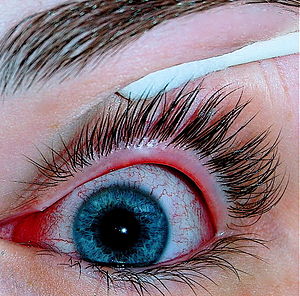Superficial bacterial infection of the eye
| Conjunctivitis | |
|---|---|
| Synonyms | Pink eye |
 |
|
| An eye with viral conjunctivitis | |
| Specialty | Ophthalmology |
| Symptoms | Reddish eye, scratchiness |
| Causes | Viral, bacterial, allergies |
| Diagnostic method | Based on symptoms, microbial culture |
| Prevention | Handwashing |
| Treatment | Based on underlying cause |
| Frequency | 3–6 million per year (USA) |
| Classification |
· ·
|
|---|---|
| External resources |
Conjunctivitis, also known as pink eye, is inflammation of the outermost layer of the white part of the eye and the inner surface of the eyelid. It makes the eye appear pink or reddish. There may also be pain, burning, scratchiness, or itchiness. The affected eye may have increased tears or be "stuck shut" in the morning. Swelling of the white part of the eye may also occur. Itching of the eye is more common in cases due to allergies. Conjunctivitis can affect one or both eyes.
The most common infectious causes are viral followed by bacterial. The viral infection may occur along with other symptoms of a common cold. Viral and bacterial cases are easily spread between people. Allergies to pollen or animal hair is also a common cause. Diagnosis is often based on signs and symptoms. Occasionally a sample of the discharge is sent for culture.
Prevention is partly by handwashing. Treatment depends on the underlying cause. In the majority of viral cases, there is no specific treatment. Most cases due to a bacterial infection will also resolve without treatment; however, antibiotics can shorten the illness. Those who wear contact lens and those with either gonorrhea or chlamydia as the cause should be treated. Allergic cases can be treated with antihistamine or mast cell inhibitor drops.
About 3 to 6 million people get conjunctivitis each year in the United States. In adults viral causes are more common, while in children bacterial causes are more common. Typically people get better in one or two weeks. If there is visual loss, significant pain, sensitivity to light, signs of herpes, or a person is not improving after a week, further diagnosis and treatment may be required. Conjunctivitis in a newborn, known as neonatal conjunctivitis, may also require specific treatment.
...
Wikipedia
